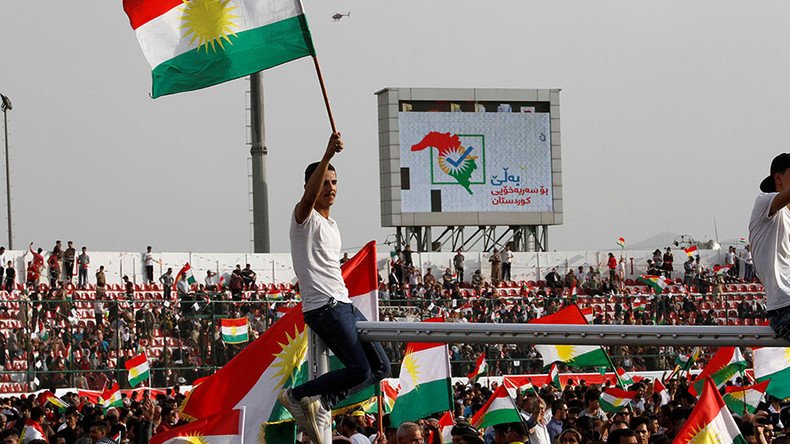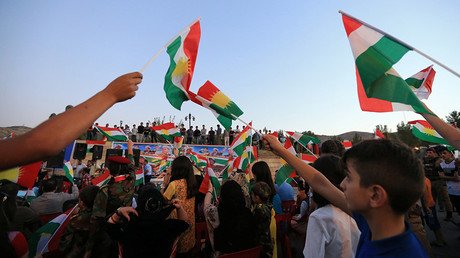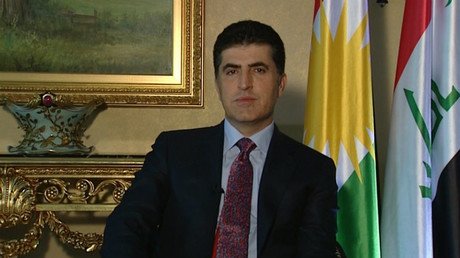US ‘strongly opposes’ Kurdistan independence vote

As Iraqi Kurds are set to vote on independence from Iraq next week, the US firmly opposes the referendum, a reversal in posture as the US has long supported the Kurds, even to the detriment of US-Turkish relations.
US Department of State spokeswoman Heather Nauert issued a stern statement on Wednesday, urging the Iraqi Kurdistan regional government not to hold a vote for their independence.
“The United States strongly opposes the Iraqi Kurdistan Regional Government’s referendum on independence, planned for September 25,” Nauert said. “All of Iraq’s neighbors, and virtually the entire international community, also oppose this referendum.”
Instead, Nauert urged Kurdish leaders to “accept the alternative” of engaging in negotiations with Baghdad, which would be facilitated by the US, the United Nations (UN) and other partners. She warned that if the referendum is held as planned, “it is highly unlikely that there will be negotiations with Baghdad” and the offer of international support during negotiations would be “foreclosed.”
Addressing thousands of supporters at a pro-referendum rally Wednesday, Masoud Barzani, the president of the Kurdistan Region, said that his government was ready and willing to hold “serious and frank dialogue” to resolve disputes with Baghdad following the referendum.
“If resolving the disputes [between Erbil and Baghdad] requires time, we could wait a year or two and then say ‘farewell’ in a peaceful and brotherly manner,” Barzani said, according to Kurdistan 24.
"I always believed in power of Kurdistan; today you doubled my belief," @masoud_barzani to crowd at #KurdistanReferendum rally in Sulaimani. pic.twitter.com/46QooJZxn4
— Kurdistan24 English (@K24English) September 20, 2017
The US State Department claims that the referendum has already affected efforts to dislodge the Islamic State from its remaining areas of control in Iraq, and added that it could jeopardize trade relations and international assistance in the area.
The State Department also said that the Kurds should “be proud already of what the referendum process has produced” including bringing unity to the Kurdish people, reviving the Kurdish parliament for the first time in nearly two years, and placing “important issues on the international stage.”
“Unfortunately, the referendum next week will jeopardize all of this momentum and more,” Nauert said. “The referendum itself is now all the more unnecessary given the alternative path that has been prepared and endorsed by the United States and the international community.”
On Wednesday, Turkish President Recep Tayyip Erdogan threatened to impose sanctions on Iraqi Kurdistan if the referendum was held as planned.
Erdogan said the Turkish cabinet and security council would discuss “what kind of sanctions we can impose,” adding that they would “not be ordinary ones.”
“We will show our determination with it. We have never left northern Iraq administration alone, we have always been close to them, we have given all sorts of support. We see this decision as implying Turkey is non-existent,” Erdogan said, according to a translation from Ruptly TV. “Therefore we will announce our position through the decision of the cabinet. I think it would be beneficial for them to see this.”
Sanctions on Kurdistan if referendum goes through ‘will not be ordinary’ – Erdogan https://t.co/r9w9UPE9JUpic.twitter.com/TLIt0h0A5I
— Ruptly (@Ruptly) September 20, 2017
Turkish armed forces have been conducting military exercises involving around 100 military vehicles including tanks and howitzers on the Iraqi border, according to Reuters. The drills began Monday and are expected to continue until September 26, the day after the planned referendum.
Turkish warplanes have also reportedly killed seven civilians in two separate airstrikes near the border with Turkey on Tuesday night, according to Kurdistan 24.
However, the Turkish military released a statement on Tuesday that claimed their fighter jets “neutralized” at least three PKK terrorists, according to Turkish Anadolu news agency.
For years, the US has pledged support for Kurds in Iraq, who have been an ally in the fight against the Islamic State, a policy that has strained relations between the US and Turkey, two NATO allies.
In May, President Donald Trump authorized the Pentagon to send arms to Kurds in Syria known as the People’s Protection Units (YPG), which Turkey equates to support for the separatists Kurdish insurgents of the PKK, which Turkey and the US both consider a terrorist organization.














